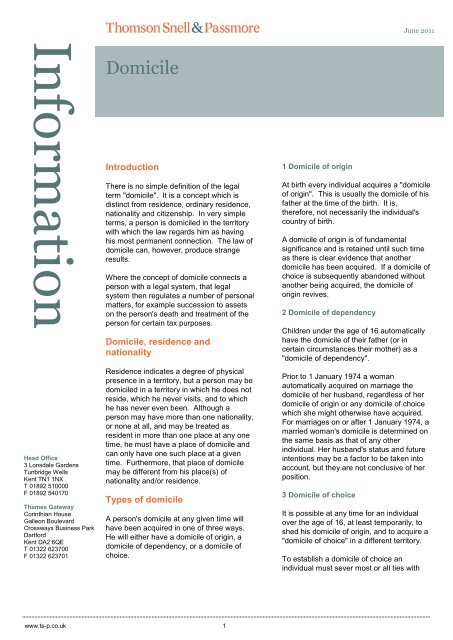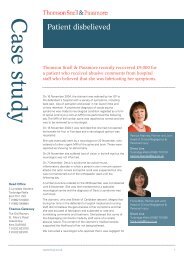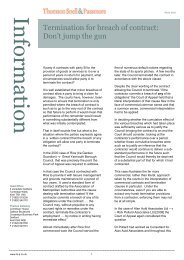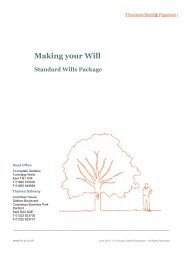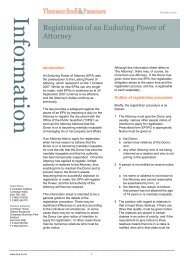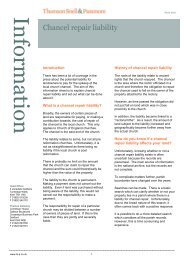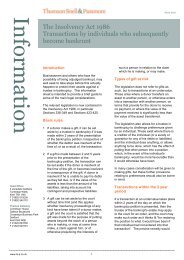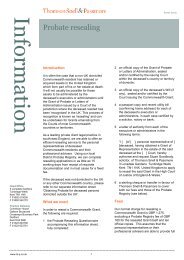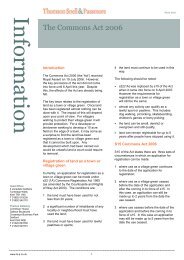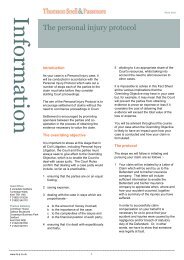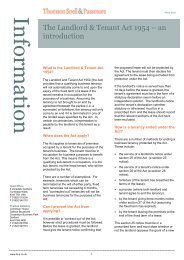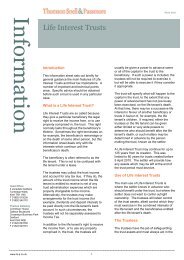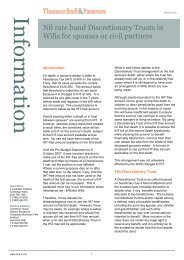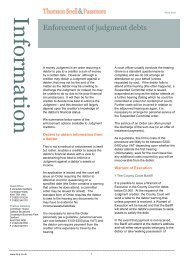Domicile - Thomson Snell and Passmore
Domicile - Thomson Snell and Passmore
Domicile - Thomson Snell and Passmore
Create successful ePaper yourself
Turn your PDF publications into a flip-book with our unique Google optimized e-Paper software.
Information<br />
June 2011<br />
<strong>Domicile</strong><br />
Head Office<br />
3 Lonsdale Gardens<br />
Tunbridge Wells<br />
Kent TN1 1NX<br />
T 01892 510000<br />
F 01892 540170<br />
Thames Gateway<br />
Corinthian House<br />
Galleon Boulevard<br />
Crossways Business Park<br />
Dartford<br />
Kent DA2 6QE<br />
T 01322 623700<br />
F 01322 623701<br />
Introduction<br />
There is no simple definition of the legal<br />
term "domicile". It is a concept which is<br />
distinct from residence, ordinary residence,<br />
nationality <strong>and</strong> citizenship. In very simple<br />
terms, a person is domiciled in the territory<br />
with which the law regards him as having<br />
his most permanent connection. The law of<br />
domicile can, however, produce strange<br />
results.<br />
Where the concept of domicile connects a<br />
person with a legal system, that legal<br />
system then regulates a number of personal<br />
matters, for example succession to assets<br />
on the person's death <strong>and</strong> treatment of the<br />
person for certain tax purposes.<br />
<strong>Domicile</strong>, residence <strong>and</strong><br />
nationality<br />
Residence indicates a degree of physical<br />
presence in a territory, but a person may be<br />
domiciled in a territory in which he does not<br />
reside, which he never visits, <strong>and</strong> to which<br />
he has never even been. Although a<br />
person may have more than one nationality,<br />
or none at all, <strong>and</strong> may be treated as<br />
resident in more than one place at any one<br />
time, he must have a place of domicile <strong>and</strong><br />
can only have one such place at a given<br />
time. Furthermore, that place of domicile<br />
may be different from his place(s) of<br />
nationality <strong>and</strong>/or residence.<br />
Types of domicile<br />
A person's domicile at any given time will<br />
have been acquired in one of three ways.<br />
He will either have a domicile of origin, a<br />
domicile of dependency, or a domicile of<br />
choice.<br />
1 <strong>Domicile</strong> of origin<br />
At birth every individual acquires a "domicile<br />
of origin". This is usually the domicile of his<br />
father at the time of the birth. It is,<br />
therefore, not necessarily the individual's<br />
country of birth.<br />
A domicile of origin is of fundamental<br />
significance <strong>and</strong> is retained until such time<br />
as there is clear evidence that another<br />
domicile has been acquired. If a domicile of<br />
choice is subsequently ab<strong>and</strong>oned without<br />
another being acquired, the domicile of<br />
origin revives.<br />
2 <strong>Domicile</strong> of dependency<br />
Children under the age of 16 automatically<br />
have the domicile of their father (or in<br />
certain circumstances their mother) as a<br />
"domicile of dependency".<br />
Prior to 1 January 1974 a woman<br />
automatically acquired on marriage the<br />
domicile of her husb<strong>and</strong>, regardless of her<br />
domicile of origin or any domicile of choice<br />
which she might otherwise have acquired.<br />
For marriages on or after 1 January 1974, a<br />
married woman's domicile is determined on<br />
the same basis as that of any other<br />
individual. Her husb<strong>and</strong>'s status <strong>and</strong> future<br />
intentions may be a factor to be taken into<br />
account, but they are not conclusive of her<br />
position.<br />
3 <strong>Domicile</strong> of choice<br />
It is possible at any time for an individual<br />
over the age of 16, at least temporarily, to<br />
shed his domicile of origin, <strong>and</strong> to acquire a<br />
"domicile of choice" in a different territory.<br />
To establish a domicile of choice an<br />
individual must sever most or all ties with<br />
www.ts-p.co.uk 1
June 2011<br />
<strong>Domicile</strong> (continued)<br />
his domicile of origin <strong>and</strong> settle in the<br />
territory in which he wishes to establish a<br />
domicile, with a clear intention of making his<br />
home there on a permanent basis.<br />
If a person wishes to establish a domicile of<br />
choice, he has the onus of proving that this<br />
has occurred, <strong>and</strong> that in consequence the<br />
domicile of origin has been displaced. Until<br />
this is proved, it is assumed that the<br />
domicile of origin is retained.<br />
There are a number of factors to which an<br />
individual can point to show that he has<br />
established a domicile of choice, but there<br />
are two overriding prerequisites:<br />
a a genuine wish to adopt the new<br />
territory as his only or his main home<br />
either permanently, or at least<br />
indefinitely, with no intention of<br />
establishing his main home<br />
elsewhere; <strong>and</strong><br />
b a physical presence in that territory.<br />
If the first condition is established, then a<br />
long period of residence is not necessary to<br />
establish the new domicile of choice.<br />
Conversely if it is absent, a period of<br />
continuous residence, for however long, will<br />
not be sufficient.<br />
Establishing a new domicile<br />
The following are pointers towards having<br />
adopted a new domicile in another territory,<br />
although probably none of them is<br />
conclusive taken by itself:<br />
1 a long period of residence;<br />
2 acquisition of permanent residential<br />
accommodation of reasonably<br />
substantial value for occupation;<br />
3 acquisition of citizenship <strong>and</strong> a new<br />
passport;<br />
4 making a Will subject to the local law;<br />
5 acquisition of a burial plot;<br />
6 exercise of local political (e.g. voting)<br />
rights;<br />
7 payment of local taxes;<br />
8 development of local business interests<br />
(e.g. directorships);<br />
9 membership of local clubs <strong>and</strong><br />
associations;<br />
10 establishment of local banking <strong>and</strong> other<br />
financial facilities;<br />
11 fostering of local business contacts;<br />
12 a formal written declaration of future<br />
intentions which, while not being<br />
conclusive, may provide useful evidence<br />
in the case of early death.<br />
Deemed domicile<br />
The Inheritance Tax (IHT) legislation<br />
contains rules which treat certain persons<br />
who are not legally domiciled within the UK<br />
as being so domiciled for most IHT<br />
purposes. These rules do not affect a<br />
person's domicile for Income Tax or Capital<br />
Gains Tax. Under the extended IHT<br />
definition of domicile, a person is treated as<br />
domiciled in the UK at the relevant time if:<br />
1 he or she has been resident in the UK in<br />
not less than 17 of the previous 20 tax<br />
years, which means that a long-term UK<br />
resident cannot shake off a UK domicile<br />
for IHT purposes until he or she has<br />
www.ts-p.co.uk 2
June 2011<br />
<strong>Domicile</strong> (continued)<br />
lived outside the UK for at least three<br />
complete tax years following the year of<br />
departure; or<br />
2 he or she was domiciled (under the<br />
general law) in the UK within the<br />
previous three calendar years.<br />
<strong>Domicile</strong> <strong>and</strong> IHT<br />
If a person dies domiciled or deemed<br />
domiciled in the UK then, subject to certain<br />
exemptions <strong>and</strong> reliefs <strong>and</strong> subject to any<br />
double taxation conventions there may be,<br />
IHT is payable on the whole of his or her<br />
estate throughout the world.<br />
If, on the other h<strong>and</strong>, a person dies<br />
domiciled outside the UK, IHT will only be<br />
chargeable on death on such of his or her<br />
assets in the UK as are subject to IHT. For<br />
example, certain British Government<br />
securities are exempt from IHT so long as<br />
the owner is neither domiciled (under the<br />
general law) nor ordinarily resident in the<br />
UK. It follows that if a person is likely to be<br />
domiciled outside the UK then, apart from<br />
exempt British Government securities, he or<br />
she should try to ensure that his or her<br />
assets in the UK do not exceed the IHT<br />
threshold.<br />
<strong>Domicile</strong> <strong>and</strong> Wills<br />
If a person is domiciled outside the UK, then<br />
it is desirable that he or she takes advice<br />
from lawyers in the relevant territory as to<br />
the most satisfactory arrangement for a Will<br />
or Wills. This is particularly important if the<br />
person owns l<strong>and</strong> abroad. Under English<br />
law, succession to immovable property such<br />
as l<strong>and</strong> is governed by the law of the<br />
country or state where the l<strong>and</strong> is situated.<br />
This law may contain strict provisions as to<br />
whether a person is obliged under his or her<br />
Will to leave the l<strong>and</strong> to particular blood<br />
relatives.<br />
If a person is domiciled abroad, then the<br />
normal arrangement would be to have his or<br />
her main Will drawn up by a lawyer in the<br />
foreign territory. This would deal with the<br />
person's worldwide assets other than<br />
property in other countries where he or she<br />
has separate Wills. The main advantages<br />
of separate Wills are:<br />
1 each can be dealt with independently in<br />
the jurisdiction concerned;<br />
2 a Will of immovable property can take<br />
account of the local law;<br />
3 each can be drafted to take account of<br />
the local tax position <strong>and</strong> may avoid<br />
unnecessary taxation resulting from a<br />
single Will, which may be tax-effective in<br />
one country but not in another;<br />
4 each can be drafted to include<br />
administrative powers <strong>and</strong> provisions<br />
which are appropriate to the territory<br />
concerned <strong>and</strong> which can be readily<br />
interpreted according to the local law;<br />
5 each can clearly define the<br />
responsibilities of each set of executors,<br />
for example, in relation to payment of<br />
particular taxes <strong>and</strong> expenses.<br />
Disclaimer<br />
This information sheet is written as a<br />
general guide. As any course of action<br />
must depend on your individual<br />
circumstances, you are strongly<br />
recommended to obtain specific<br />
professional advice before you proceed.<br />
We do not accept any responsibility for<br />
www.ts-p.co.uk 3
June 2011<br />
<strong>Domicile</strong> (continued)<br />
action which may be taken as a result of<br />
having read this information sheet.<br />
If you require further information, please<br />
contact Jeremy <strong>Passmore</strong>, Simon Brown,<br />
Stuart Goodbody or Mark Politz on 01892<br />
510000 or by email at:<br />
jeremy.passmore@ts-p.co.uk<br />
simon.brown@ts-p.co.uk<br />
stuart.goodbody@ts-p.co.uk<br />
mark.politz@ts-p.co.uk<br />
© <strong>Thomson</strong> <strong>Snell</strong> & <strong>Passmore</strong> LLP All Rights Reserved<br />
www.ts-p.co.uk 4


